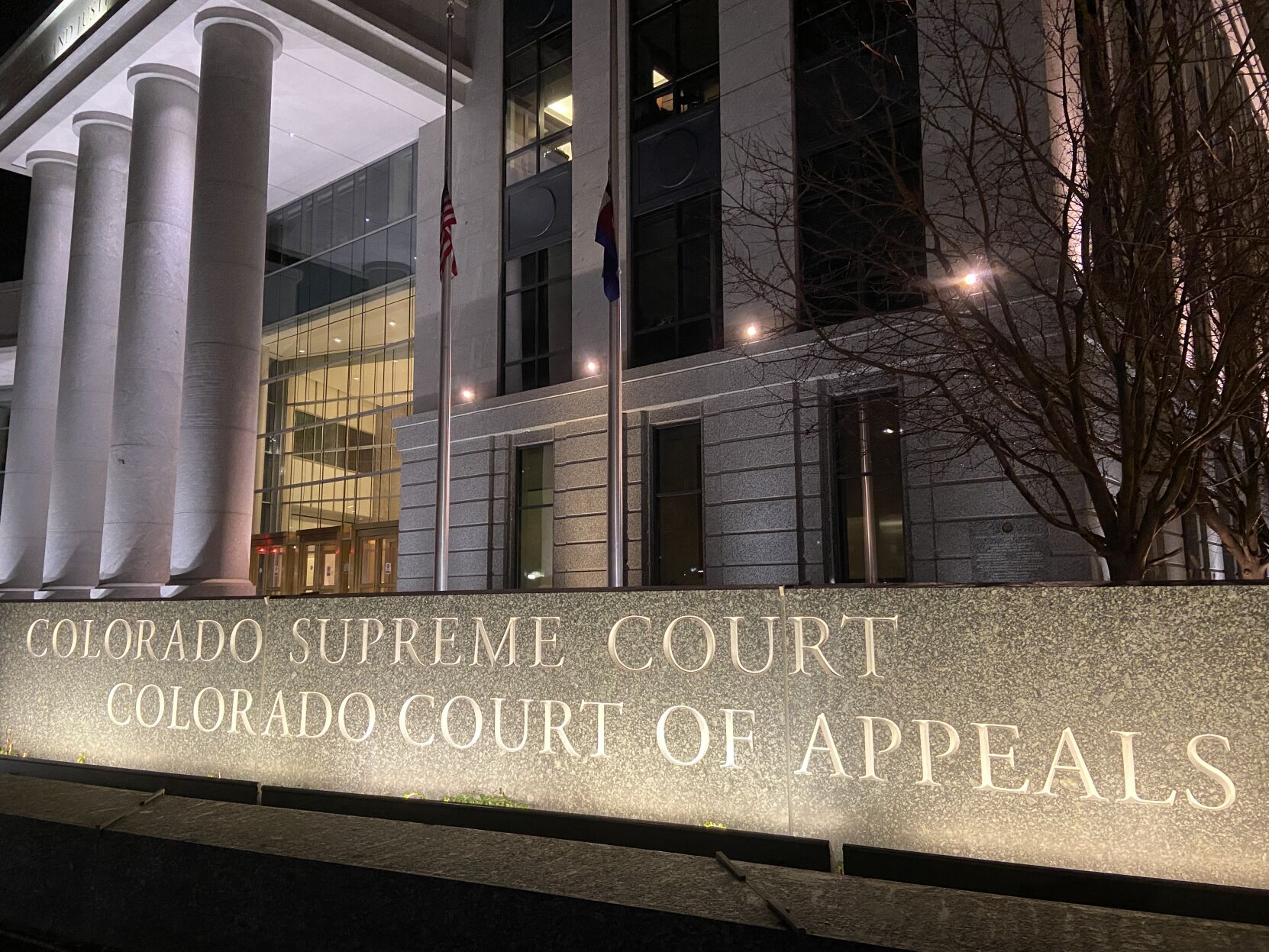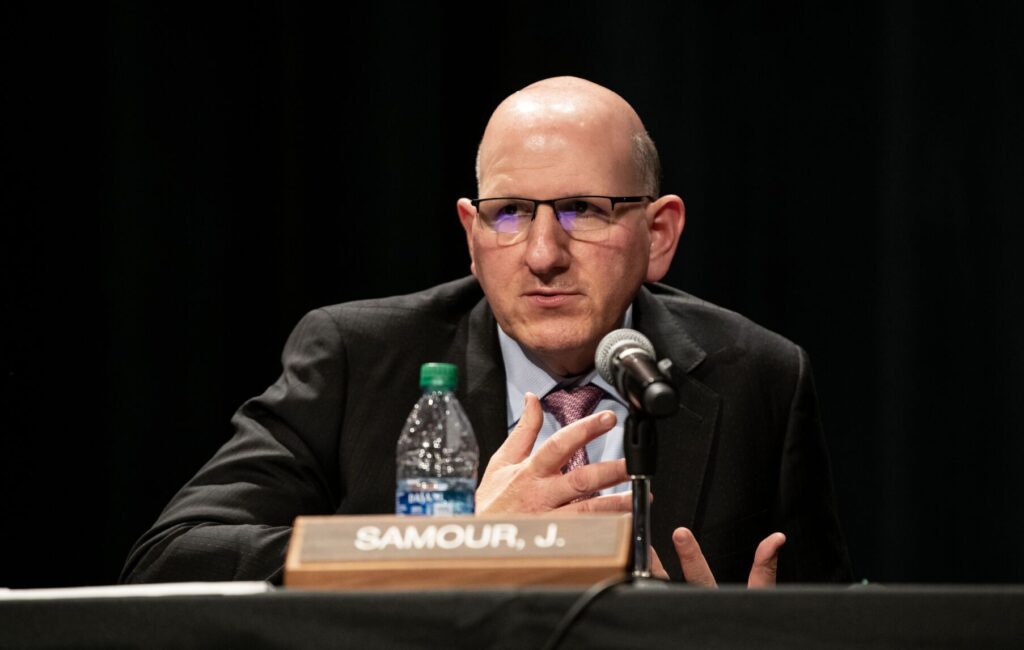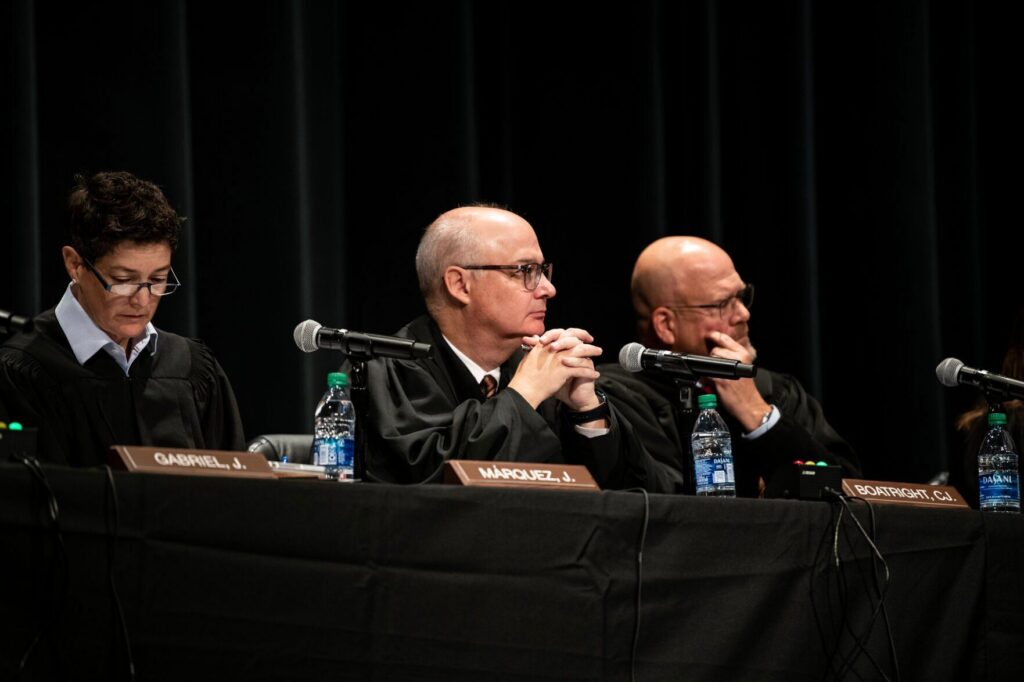Will Coloradans ‘just have to live with it?’ Justices consider constitutionality of state harassment law

If the Colorado Supreme Court decides yet again that part of the state’s harassment law is unconstitutional, residents may have to simply put up with targeted harassment that occurs online or via phone.
The state’s justices pondered that possibility on Tuesday as they listened to oral arguments over a Garfield County judge’s decision to strike down the part of the law that criminalizes directed communication with someone over phone, computer or Internet if there is an “intent to harass.”
The government is asking the high court to reverse the determination that the wording is too vague and broad, arguing that harassment has a clearly-understood meaning and the recipient may not be able to escape unwanted contacts in cyberspace.
“It is a significant intrusion into a place that you need to survive in a modern world with email, text messages. And a place where we shouldn’t have to continue to be bombarded with harassing messages,” said Donald R. Nottingham, chief deputy district attorney for the Ninth Judicial District Attorney’s Office in Glenwood Springs.
On the other hand, Alfred Elias Moreno, who is charged with harassing his ex-wife through electronic communications, said that emails and social media posts can simply be screened, trashed or blocked. The problem is that the law “covers perfectly legitimate airing of grievances,” criminalizing everything from consumers’ repeated emails about defective products to parents persistently texting their child to do chores, contended Deputy State Public Defender Casey Mark Klekas.
Moreno’s communications differed markedly, however, from the examples his attorney cited.
“Help me understand why referring to his ex as a whore and saying she has an STD on Facebook and email is something that has social utility,” Justice William W. Hood III asked Klekas.
The prosecution’s submission to the court indicated the various attempts Moreno made to contact his ex-wife online, even after she told him to stop.
“I’m glad you are finally back to reality of your a who’re! [sic] And I fkng hate you!” he wrote on one occasion.
“Why did you have my kids stop talking to me? You making your new bf there [sic] daddy?” he added.
At one point, she wrote back in all capital letters, “LEAVE ME ALONE. NO CONTACT, NO TEXTS, NO CALLS, NO EMAILS, NOTHING.”
Moreno continued to disregard her request, ultimately posting publicly on Facebook: “Will you please tell her to have my kids call me asap. You can have her and the STD I just want my kids to contact me.”
The district attorney’s office insisted that his speech was criminal, and not protected under the First Amendment.
“It is this continuing disregard for another person’s privacy and sanctity that make his conduct illegal. The content of the defendant’s messages is not at issue, and is relevant only to his intent,” prosecutors argued.
District Court Chief Judge James Berkley Boyd determined that it is overly broad and vague for the law to criminalize communications “intended to harass” others, and dismissed the charge. If a law is vague, it does not provide notice of what conduct is prohibited, whereas an overly broad law criminalizes constitutionally-protected conduct. The prosecution appealed directly to the Supreme Court.
Justice Melissa Hart questioned what types of common, even benign communications may be swept up in the law if the court allowed the language to stand.
“If it’s as open as ‘persistently annoying,’ that could suggest I can send dozens of emails to someone saying, ‘Why won’t you respond to me. I’m trying to reach you. Why won’t you answer me? Why won’t you answer me? Why won’t you answer me,” she said. “Nothing threatening or worrisome in that, but it’s pretty annoying. Would that be a violation?”
Nottingham emphasized that it was the intent of the alleged harasser that mattered.
“Your intention was not to annoy them but to get a response,” he said.
“You direct a communication in a manner intended to harass. What does that mean?” asked Justice Richard L. Gabriel, who believed the word “harass” had an insufficient limitation. “The legislature keeps trying and it keeps creating problems.”
Gabriel’s reference was to a handful of prior Supreme Court cases that found various phrasings of the harassment law unconstitutional. In the 1975 decision of Bolles v. People, the court struck down the wording that criminalized communication over mail or telephone “in a manner likely to harass or cause alarm.” The case involved the acting leader of the Colorado Right to Life Council in Boulder County, who sent brochures depicting aborted fetuses to 2,400 residents.
If the standard under the law was to cause alarm, the court decided, “it would therefore be criminal in Colorado to forecast a storm, predict political trends, warn against illnesses, or discuss anything that is of any significance.”
After the legislature changed the law to mandate there be an “intent to harass” or alarm, the Supreme Court again in 1993 struck down another part of the law that prohibited “repeated communications at inconvenient hours or in offensively coarse language.” That is not the type of speech the government may criminalize, the court decided.
Colorado is not the only state to undergo First Amendment challenges to its harassment law. In 2019, a Texas man petitioned the U.S. Supreme Court to argue that the state’s harassment law, which is similar to Colorado’s, violated the First Amendment by criminalizing not just threats or obscenity, but other forms of constitutionally-protected speech. Texas’s attorney general responded that the law was not overly broad or vague because it required intent, repetition and a reasonable likelihood that the average person would be offended.
The Supreme Court declined to hear the case.
While some of Colorado’s justices are worried about the wide range conduct that might be criminal under the current harassment law – such as repeatedly calling an elected official and berating then to change their position – others wondered what might happen if the court struck down the language yet again.
“How do we get at this body of insulting behavior that has no real social utility? Do those folks just get a windfall because of concerns about constitutionally-protected speech?” asked Hood. In essence, he added, the court would be saying, “There is no legitimate way to get at this. We just have to live with it.
“That’s surely very unsatisfying to people who have to put up with this nonsense.”
The case is People v. Moreno.

michael.karlik@coloradopolitics.com













